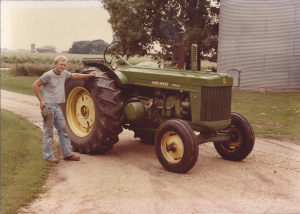“Don’t expect Iowa farmers to ‘feed the world’,” reads the headline of a recent editorial in The Des Moines Register.
You can bet that headline both sickened me and spurred action. Below is a copy of the response I sent yesterday to the Register…
I’m saddened by the timing of the negative editorial because we are in the middle of World Food Prize week, a time when the world turns its eyes to Iowa to salute those who dedicate their lives to discovering innovations that feed people in need. But, I’m not surprised by the Register editorial since its editorial staff seems to be spending too much time with “scary clowns.”
Scary clowns spread fear. Fear must sell a lot of newspapers. Scary clowns aren’t just an internet phenomenon, now showing up in our communities. Fear is also a weapon, a tactic that is passed around, printed and repeated, spreading faster than palmer amaranth seeds in a fertile farm field.
The Environmental Working Group has been trying to scare us all for quite some time, and the Register editors are all too happy to spread their fearful messages without question or any attempt to gain another perspective. Iowa farmers hope common sense Iowans can unmask the hype.
 My perspective is based on experience; I’ve been farming since 1973. I know innovation in farming not only helps us grow more food, it helps us do more with less: less pesticides, less tillage and turning of the soil, less erosion, less runoff of manure. I have had farmers and visitors from around the world including China, and Japan come to my farm to learn how we do it. The Des Moines Editorial chief went to China and marveled at the technology, yet his team leads the charge against the very same innovative livestock barns being built here! Why? Perhaps he and his staff are too young to remember what it was really like “back in the day.”
My perspective is based on experience; I’ve been farming since 1973. I know innovation in farming not only helps us grow more food, it helps us do more with less: less pesticides, less tillage and turning of the soil, less erosion, less runoff of manure. I have had farmers and visitors from around the world including China, and Japan come to my farm to learn how we do it. The Des Moines Editorial chief went to China and marveled at the technology, yet his team leads the charge against the very same innovative livestock barns being built here! Why? Perhaps he and his staff are too young to remember what it was really like “back in the day.”

Back in the 70’s, the ditches were full of black snow each winter because we had to turn the soils to kill the weeds and used a lot more chemicals to grow a crop. Back in the 70’s, more livestock was raised on feedlots than modern livestock barns, so manure washed off during a heavy rainstorm. Where did it go? It went into the watersheds, but the state wasn’t monitoring it then like it does now.
Slowly, it’s turning around. Innovation in livestock farming, seeds, equipment and knowledge learned from the Nutrient Reduction Strategy is making a difference. I see it myself; in the time I have been farming, the drainage creek that runs through my land is so clear that you can’t see the water. You only see the stream bed. The waterways and buffer strips have done a great job on my farm, but all farms are different. Cover crops and other technologies in the last five years are making a huge difference!
Are all watersheds like that stream by my farm? No, and that’s why better monitoring and lowered thresholds show new places for us all to begin. I accept the challenge of continuously trying new things to make water better for all, and I’m not alone in thinking that way.
Iowa farming is successful and that success draws the world to our farms during World Food Prize week and beyond! I happen to think we should be embracing our success, not romancing the past, or forcing us all to farm like it’s 1974 because that style of farming doesn’t suit consumer needs today. Trying to “force fit” the past on all farmers is about a scary as forcing us all to squeeze back into the bell-bottom jeans we wore in 1974 – now that’s a scary thought!
